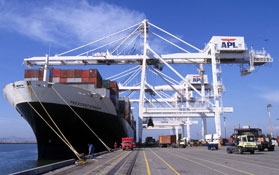UC economists project farm export gains from free trade agreements
Analysis of the recently approved United States free trade agreement with South Korea in the April-June 2011 issue of the California Agriculture journal shows how California farm exports will now have much improved access to the large South Korean market, significantly enhancing competitive prospects for almonds, walnuts, dairy products, beef and oranges, among other important California commodities.
Legislation implementing the Korea free trade agreement, along with smaller agreements with Colombia and Panama, were negotiated several years ago. They finally gained Congressional approval on Oct. 12 and are set to be signed by President Obama on Oct. 21.
By phasing out or eliminating tariffs and other trade barriers, free trade agreements create larger markets for California-produced farm commodities. Since South Korea has no significant prospects to export farm goods to the United States, California agriculture is a clear winner from this agreement.
Hyunok Lee and Daniel Sumner from the Department of Agricultural and Resource Economics at UC Davis and the UC Agricultural Issues Center document the current importance of South Korea to California farm exports, the size of the trade barriers these exports have faced (many facing tariffs of more than 30 percent) and the advantages currently afforded by South Korea’s existing free trade agreements with important competitors, such as Chile and Australia.
“Lower trade barriers will allow California agriculture to better compete in a large, growing and lucrative market,” said Sumner.
“Food product prices are high in South Korea and consumers are willing to pay premiums for the high-quality products produced in California,” added Lee.
South Korea has a strong economy with about 50 million consumers and per-capita income of $30,000, higher than many European countries. In 2010, the value of California farm exports to South Korea was more than $400 million. Given the size of South Korea’s economy and the high trade barriers being erased, Sumner and Lee say the accord will do more for farm exports than agreements negotiated for almost 20 years.
Among other findings, the authors report that:
- The top California ag exports to South Korea are fresh oranges, with tree nuts, rice, and beef and beef products also in the top five.
- Other California crops that hold a double-digit share of the South Korean market are hay, grape juice and kiwifruit.
- With an import tariff of about 45 percent, South Korean imports of California table grapes, fresh strawberries, fresh apples and lettuce and rice are small, but have great potential for growth.
- South Korea is becoming a major export market for California grapefruit and lemons. Lower tariffs will increase demand.
- The United States is South Korea’s only supplier for almonds and the U.S. has more than a 90 percent share of walnuts. The current 8 percent almond tariff will be eliminated and walnut tariffs will be phased out over the next 6 to 15 years.
- Beef products are the top agricultural import (from all sources) into South Korea by value. With the new agreement, the within-quota tariff will fall by 2.7 percent each year, providing a gain for U.S. producers compared to import competitors.
- South Korea has high trade barriers for many dairy products, but with gradual reductions under the new agreement, the market will grow.
MEDIA CONTACTS:
Daniel Sumner is available to comment on the free trade agreements with South Korea, Panama and Columbia. He can be reached at dasumner@ucdavis.edu, (530) 752-1668.
Hyunok Lee can comment about the size and potential growth of the Korean market. She can be reached at (530) 752-3508, hyunok@primal.ucdavis.edu.

